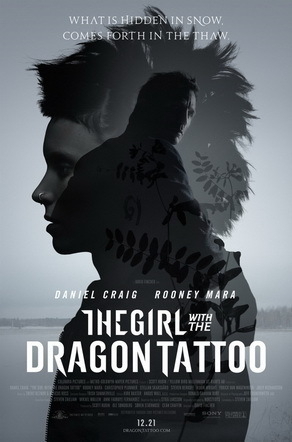Blog
The Girl With The Dragon Tattoo (2011): A Review
When it comes to the work of David Fincher (one of my favorite director’s going today), he seems to thrive on what has become the popular formula for creatives who wish to continue working in the Hollywood system - a simple game best described as “one for you, and one for me”. Â He does the blockbuster film to make the studio happy, then works his way into doing a personal film - a project that wouldn’t otherwise be greenlit, but gets the go ahead due to his prior successes.
Typically, his better films are the passion projects - films like Se7en, Zodiac and Fight Club.  Which isn’t to say that the movies “for them” haven’t been good - just Panic Room and The Curious Case of Benjamin Button tend to stand out amongst his more difficult, less accessible films.  I suppose one wouldn’t expect anything less for a filmmaking perfectionist who got his start making commercials for Nike.  But last year, that all changed - a project that would probably be best described as “one for him”, a film chronicling the creation of a ridiculously well known website - The Social Network became a critical and box office hit, nabbing Fincher some much needed Academy Awards. No longer were they just “for him”, Fincher now was an artist for “us” - both himself and the studio.
So, it should come as little surprise that when Sony needed someone to head up the American adaptation of The Girl With The Dragon Tattoo, they went to Mr. David Fincher. Â He clearly excels at communicating hard to understand concepts to audiences (he made Facebook interesting in The Social Network), he understands the obsession one has when solving a crime (Zodiac), and he has spent some time in the dark, deplorable depths of mankind (Se7en). All of these tools come into play here.
When I originally saw the Swedish version of The Girl With The Dragon Tattoo, I was really surprised - after seeing copies in nearly everyone’s hand, I can’t say that a dark tale about a magazine publisher, an abused hacker girl, an unsolved murder, and well, a LOT of rape was what I anticipated. Â But once Fincher was signed, I could see how it could be worked, how it could be communicated again to an audience who, well, doesn’t want to deal with subtitles. Â Unfortunately, many of the flaws of that film were clearly of the source material - as they happen again here.
The story is overwrought with detail and length - the original film was a hefty 152 minutes, and you felt every single one of them - Fincher’s version runs six minutes longer.  Luckily, he’s a bit more adept behind the camera - while the movie is long, you are drawn in by the amazing composition of each frame, making Sweden equal parts beautiful and haunting.  He’s mastered the montage of people looking at computers, piecing together information - what could be difficult to follow or slow in one directors hands feels important and in the moment here - that said, I could have easily done without a half hour of the film.  But I suppose that is the dilema of playing in another’s sandbox.  There is an expectation to deliver what is on the page right onto the screen - and while I’ve never read the books myself, I have a hunch there is nary a scene cut or detail missed.  To that point, the 3rd acts flaws remain intact, leaving the viewer wondering “can we just skip to the end”?
That said, what is at it’s core a flawed film, is surrounded by strong acting - the cast, full of solid character actor work (Christopher Plummer and Stellan Skarsgard do some superb work here) is anchored in what may become franchise roles for both Daniel Craig and Rooney Mara.  Craig, as the lead, Mikael Blomkvist, truly feels driven in his pursuit of the truth and brings a strength to the role that I felt was missing in the Swedish original.  Mara will certainly be remembered for her turn as Lisbeth Salander - she’s completely unrecognizable, lost in a mishmash of piercings and tattoos, hiding herself from the world that appears to have turned against her every step of the way.  Also worth mentioning is the continued working relationship between David Fincher and the musical team of Trent Reznor & Atticus Ross.  As much as their work drove The Social Network forward, they take a more subtle approach here - their driving cover of “Immigrant Song” may kick off the film, but from there it’s beautiful ambient work, some of the finest instrumental work Reznor has done.  No matter your feelings on the movie once the final spool runs, you’ll want a copy of the soundtrack. (In fact, I’m listening to it as I write now).
I admit, my perspective on the film is skewed - I haven’t read the original book, and only have seen the film, but that said, for a newcomer to the Millennium Trilogy, I’d recommend this American take. Â For those who love the original film? You may want to wait for a matinee, or just pick up the soundtrack.
It may sound like I disliked the film more than I did, but I suppose at the end of the day, I was disappointed. In the world of adaptations, you’re only as good as the original work which you came away from. Fincher, Mara and Craig do their best to lift up the project, but at the end of the day, the flaws which exist in the length and scope of the story drag the work down.
The Girl With The Dragon Tattoo aims high, and delivers as best it can, but at the end of the day, it just couldn’t stick the landing.
Monday December 19, 2011
